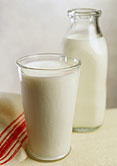- Could Your Grocery Store Meat Be Causing Recurring UTIs?
- Are You Making This Expensive Thermostat Error This Winter?
- Recognizing the Signs of Hypothyroidism
- 10 Strategies to Overcome Insomnia
- Could Artificial Sweeteners Be Aging the Brain Faster?
- Techniques for Soothing Your Nervous System
- Does the Water in Your House Smell Funny? Here’s Why
- Can a Daily Dose of Apple Cider Vinegar Actually Aid Weight Loss?
- 6 Health Beverages That Can Actually Spike Your Blood Sugar
- Treatment Options for Social Anxiety Disorder
Milk, Egg Allergies Seem to Make Parents Most Anxious


Parents and other caregivers of children who are allergic to milk and eggs have higher anxiety and stress levels than those whose children are allergic to peanuts, researchers report.
That finding even surprised the authors of the study published in the July issue of the journal Annals of Allergy, Asthma and Immunology.
“It’s assumed peanut and tree allergies are the most severe, and therefore it may be presumed they would cause the most strain for caregivers,” lead author and allergist Dr. Laura Howe said in a journal news release.
“But because eggs and milk are everywhere, and used to prepare so many dishes, caregivers with children allergic to those two ingredients feel more worried and anxious,” she explained.
Howe and colleagues surveyed 305 caregivers of children allergic to milk, eggs, peanuts or tree nuts — the four most common food allergies — and found that knowledge was important for peace of mind. Caregivers who knew exactly which foods could trigger an allergic reaction in their child had lower anxiety and stress levels.
The researchers also found that 64 percent of caregivers clearly understood the severity of their child’s allergic reaction. Another 19 percent thought the reaction was less severe than it actually was. And, more than 15 percent thought the reaction was more severe than it really was.
Many caregivers said they were greatly concerned about their ability to help their child in the event of an allergic reaction. Many also said that other people wouldn’t understand the serious threat posed by their child’s food allergy.
“It is important for those who care for food-allergic children to work with an allergist to determine exactly what foods their child is allergic to, and how to respond in an emergency situation,” Dr. Michael Foggs, president of the American College of Allergy, Asthma and Immunology, said in the news release.
“Parents need to have a clear plan of action in case their child eats a food they shouldn’t. Children with a history of severe allergic reactions, and their caregivers, need to know how to administer epinephrine. Having plans in place can ease a parent’s worries,” he said.
More information
The U.S. National Library of Medicine has more about food allergy.
Source: HealthDay
Copyright © 2026 HealthDay. All rights reserved.










